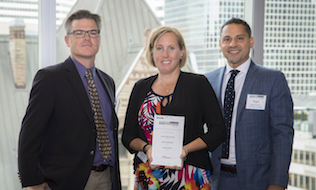

While Ontario Power Generation has had a major medical absence program in place for years, it saw an opportunity for a review and update in 2016, leading to changes that solidified its win for best absence management program at Benefits Canada’s 2018 Workplace Benefits Awards on Oct. 11.
Working with many stakeholders, including unions, human resources professionals, service providers, health services and an external auditor, it aimed to identify where it could improve both employee health and absence management. As a multi-union employer, it was also integral for the utility company to engage early and thoroughly with its unions, since absence management can be a potentially sensitive issue in negotiations.
Read: EPCOR Utilities wins award for absence management process
Specifically, the review found 36 different items for improvement, including communicating with employees; expanding case management; further integrating the program with the existing employee assistance program; better coordinating the resources of its existing major medical absence program and OPG’s long-term disability program; creating a system for secondary reviews of absences; and providing return-to-work coordination.
The company also set up a committee to monitor the program’s efforts and effectiveness, and implemented an attendance support program. The project aimed to provide supervisors with a consistent approach to managing sick leave using regular conversations to reinforce attendance expectations, while simultaneously offering support through accommodation, if necessary. These conversations, the award entry emphasized, were also opportunities to reassure employees of their valuable contribution.
The program also aimed to promote the best possible attendance records, as well as raising employees’ awareness of how important consistent attendance is for the organization. It allows supervisors to assist employees in overcoming difficulties that prevent consistent attendance and to prevent absences from increasing. Finally, it helps supervisors address scenarios where attendance issues became unacceptable.
Read: Mental-health first aid training targets rising disability concerns in electricity sector
OPG also brought in new insights on looking at health holistically, including mental health, which it gained from its 2014 total health strategy. Within this strategy, managers became more aware of how to handle mental-health issues with their employee populations, including learning mental-health first aid. Also, in seeking to expand support to employees’ mental health, the company added DepressionCare and InfluenceCare programs to its employee assistance program in order to offer additional specialist and counselling services.
Specifically, DepressionCare is meant to help identify and provide assistance to employees showing signs of missing work and potentially going on disability for depression before they reach the point of doing so. InfluenceCare works through a combination of technologies and clinical expertise to focus on the most common causes for extended absenteeism, such as mental-health problems or musculoskeletal conditions in order to accelerate treatment and shorten return-to-work timeframes, thus reducing the overall cost of the absenteeism.
“It’s not about us wanting to get them back to work as soon as possible,” says Tanya Hickey, senior manager of health and safety strategies at OPG. “We want the best care for the employees. We’re not rushing them back, we want to make sure they get proper treatment.”
Read: How to optimize wellness programs to reduce absenteeism
Overall, employees who have used the program have reported they better understand the role they play in absence management, as well as the roles of the other parties involved.
Going further, OPG piloted a program called First Day, which seeks to reduce instances of sick leave and major medical absences. The program involves intake representatives and early intervention case managers to engage in return-to-work scenarios, but also emphasized a discretionary model that didn’t require medical documentation for minor claims such as colds, flus or sprains.
As well, managers were better able to keep track of when to take action to effectively support workers showing patterns of absences through the First Day program. Emails automatically notified managers as soon as an employee reached a certain threshold of absences, which helped them take real-time responses as opposed to the traditional option of reviewing absences quarterly. This ensured that a manager was automatically involved on day one of an employee’s absence.
“Particularly for attendance management, that’s a big cultural shift, where, traditionally, it’s been viewed as us against them, especially when you’re talking with unions,” says Craig Axler, director of health and safety at OPG. “So getting everyone to understand that we all want to be part of the same direction is great.”
Read: How to address workplace absenteeism
The 2016 review, and its subsequent enhancements, are already seeing measurable results. Between 2016 and the first quarter of 2018, the company saw a seven per cent decrease in pre-major medical absence days lost, a 23 per cent decrease in its average major medical absence closed-claim duration and a 31 per cent decrease in days lost per 1,000 employees from major medical absences.
As well, the company saw a 31 per cent decrease in the duration of mental-health disorder cases and a 17 per cent decrease in cases of musculoskeletal conditions. It has also seen a 50 per cent reduction in long-term disability outcomes, which further establishes that OPG’s enhancements are working and encourages it to continue on this path.
Read the full list of 2018 Workplace Benefits Awards winners here. And stay tuned in the coming days to learn more about each of the winners.
